陶洁《美国文学选读》笔记和课后习题(含考研真题)详解-第一章至第六章【圣才出品】
陶洁《美国文学选读》(第3版)【章节题库】-第1~7单元【圣才出品】
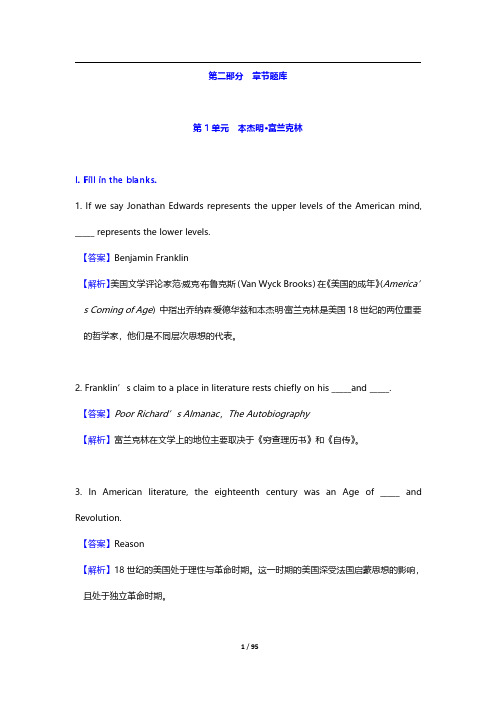
第二部分章节题库第1单元本杰明·富兰克林І.Fill in the blanks.1.If we say Jonathan Edwards represents the upper levels of the American mind, _____represents the lower levels.【答案】Benjamin Franklin【解析】美国文学评论家范·威克·布鲁克斯(Van Wyck Brooks)在《美国的成年》(America’s Coming of Age)中指出乔纳森·爱德华兹和本杰明·富兰克林是美国18世纪的两位重要的哲学家,他们是不同层次思想的代表。
2.Franklin’s claim to a place in literature rests chiefly on his_____and_____.【答案】Poor Richard’s Almanac,The Autobiography【解析】富兰克林在文学上的地位主要取决于《穷查理历书》和《自传》。
3.In American literature,the eighteenth century was an Age of_____and Revolution.【答案】Reason【解析】18世纪的美国处于理性与革命时期。
这一时期的美国深受法国启蒙思想的影响,且处于独立革命时期。
4.Franklin was the epitome of the_____,the versatile,practical embodiment of national man in the18th century.【答案】Enlightenment【解析】富兰克林是启蒙思想的缩影,是18世纪理性的代表。
5.Benjamin Franklin’s best writing is found in his masterpiece_____.【答案】The Autobiography of Benjamin Franklin【解析】本杰明·富兰克林文学上最大的成就体现在他的作品《本杰明·富兰克林自传》上。
陶洁《美国文学选读》课后习题详解(本杰明 富兰克林)【圣才出品】
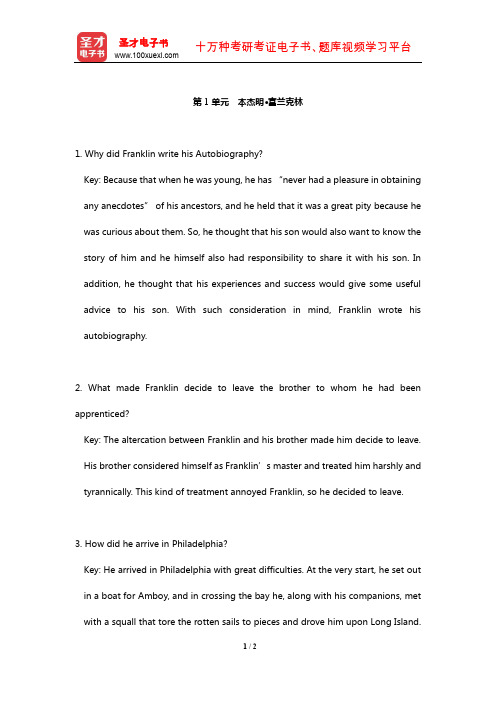
第1单元本杰明•富兰克林1. Why did Franklin write his Autobiography?Key: Because that when he was young, he has “never had a pleasure in obtaining any anecdotes” of his ancestors, and he held that it was a great pity because he was curious about them. So, he thought that his son would also want to know the story of him and he himself also had responsibility to share it with his son. In addition, he thought that his experiences and success would give some useful advice to his son. With such consideration in mind, Franklin wrote his autobiography.2.What made Franklin decide to leave the brother to whom he had been apprenticed?Key: The altercation between Franklin and his brother made him decide to leave. His brother considered himself as Franklin’s master and treated him harshly and tyrannically. This kind of treatment annoyed Franklin, so he decided to leave.3. How did he arrive in Philadelphia?Key: He arrived in Philadelphia with great difficulties. At the very start, he set out in a boat for Amboy, and in crossing the bay he, along with his companions, met with a squall that tore the rotten sails to pieces and drove him upon Long Island.On approaching the island, they had to drop anchor and swim out their cable towards the shore, etc. In a word, he went through many hardships on the way to Philadelphia.4. What features do you find in the style of the above selection?Key: This selection is written in the form of letters to his son. By this way, it can show the author’s honesty and frankness, which will make the reader stand close to him and actually feel and understand his emotions and experiences. Another feature is that this biography has a good narrative and reads like a story, which can arouse the readers’ reading interest and curiosity.。
陶洁《美国文学选读》笔记和课后习题(含考研真题)详解(本杰明 富兰克林)【圣才出品】
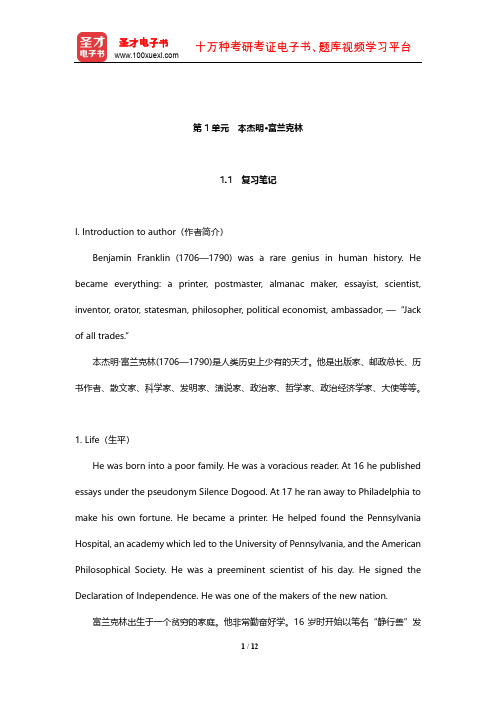
第1单元本杰明•富兰克林1.1 复习笔记I. Introduction to author(作者简介)Benjamin Franklin (1706—1790) was a rare genius in human history. He became everything: a printer, postmaster, almanac maker, essayist, scientist, inventor, orator, statesman, philosopher, political economist, ambassador, —“Jack of all trades.”本杰明·富兰克林(1706—1790)是人类历史上少有的天才。
他是出版家、邮政总长、历书作者、散文家、科学家、发明家、演说家、政治家、哲学家、政治经济学家、大使等等。
1. Life(生平)He was born into a poor family. He was a voracious reader. At 16 he published essays under the pseudonym Silence Dogood. At 17 he ran away to Philadelphia to make his own fortune. He became a printer. He helped found the Pennsylvania Hospital, an academy which led to the University of Pennsylvania, and the American Philosophical Society. He was a preeminent scientist of his day. He signed the Declaration of Independence. He was one of the makers of the new nation.富兰克林出生于一个贫穷的家庭。
陶洁《美国文学选读》(第3版)章节题库-第五章至第六章【圣才出品】
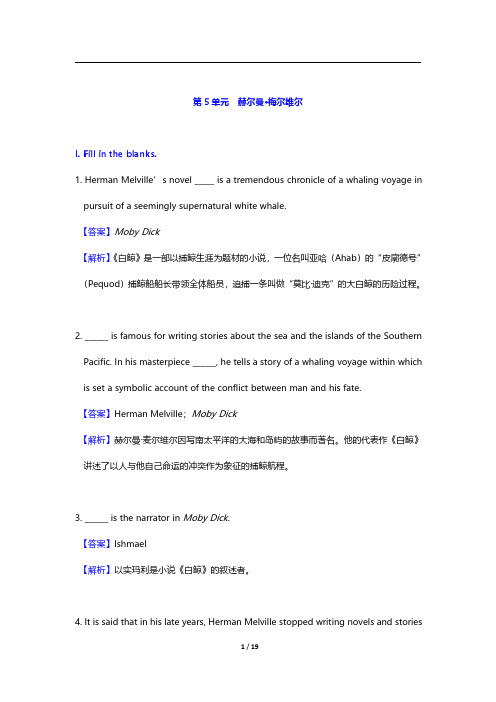
第5单元赫尔曼·梅尔维尔I.Fill in the blanks.1.Herman Melville’s novel_____is a tremendous chronicle of a whaling voyage in pursuit of a seemingly supernatural white whale.【答案】Moby Dick【解析】《白鲸》是一部以捕鲸生涯为题材的小说,一位名叫亚哈(Ahab)的“皮廓德号”(Pequod)捕鲸船船长带领全体船员,追捕一条叫做“莫比·迪克”的大白鲸的历险过程。
2.______is famous for writing stories about the sea and the islands of the Southern Pacific.In his masterpiece______,he tells a story of a whaling voyage within which is set a symbolic account of the conflict between man and his fate.【答案】Herman Melville;Moby Dick【解析】赫尔曼·麦尔维尔因写南太平洋的大海和岛屿的故事而著名。
他的代表作《白鲸》讲述了以人与他自己命运的冲突作为象征的捕鲸航程。
3.______is the narrator in Moby Dick.【答案】Ishmael【解析】以实玛利是小说《白鲸》的叙述者。
4.It is said that in his late years,Herman Melville stopped writing novels and storiesand turned to poetry,______is his most famous poetic work.【答案】Clarel【解析】麦尔维尔发表的小说在当时反响平平,晚年他放弃小说改写诗歌。
陶洁《美国文学选读》笔记和课后习题(含考研真题)详解(斯蒂芬克莱恩)【圣才出品】
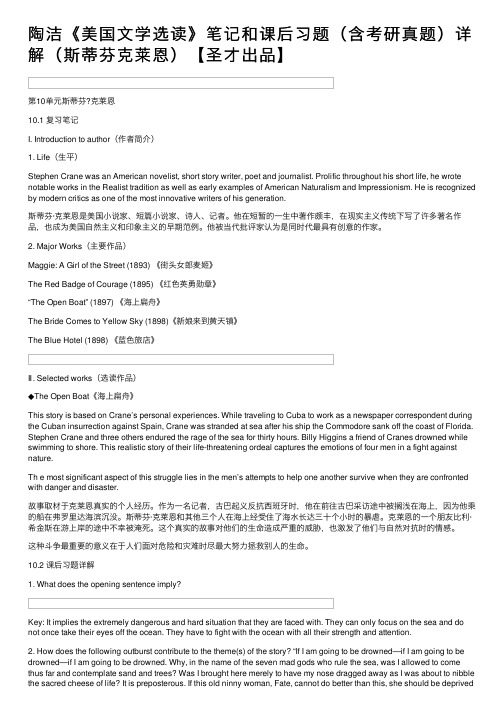
陶洁《美国⽂学选读》笔记和课后习题(含考研真题)详解(斯蒂芬克莱恩)【圣才出品】第10单元斯蒂芬?克莱恩10.1 复习笔记I. Introduction to author(作者简介)1. Life(⽣平)Stephen Crane was an American novelist, short story writer, poet and journalist. Prolific throughout his short life, he wrote notable works in the Realist tradition as well as early examples of American Naturalism and Impressionism. He is recognized by modern critics as one of the most innovative writers of his generation.斯蒂芬·克莱恩是美国⼩说家、短篇⼩说家、诗⼈、记者。
他在短暂的⼀⽣中著作颇丰,在现实主义传统下写了许多著名作品,也成为美国⾃然主义和印象主义的早期范例。
他被当代批评家认为是同时代最具有创意的作家。
2. Major Works(主要作品)Maggie: A Girl of the Street (1893) 《街头⼥郎麦姬》The Red Badge of Courage (1895) 《红⾊英勇勋章》“The Open Boat” (1897) 《海上扁⾈》The Bride Comes to Yellow Sky (1898)《新娘来到黄天镇》The Blue Hotel (1898) 《蓝⾊旅店》Ⅱ. Selected works(选读作品)◆The Open Boat《海上扁⾈》This story is based on Crane’s personal experiences. While traveling to Cuba to work as a newspaper correspondent during the Cuban insurrection against Spain, Crane was stranded at sea after his ship the Commodore sank off the coast of Florida. Stephen Crane and three others endured the rage of the sea for thirty hours. Billy Higgins a friend of Cranes drowned while swimming to shore. This realistic story of their life-threatening ordeal captures the emotions of four men in a fight against nature.Th e most significant aspect of this struggle lies in the men’s attempts to help one another survive when they are confronted with danger and disaster.故事取材于克莱恩真实的个⼈经历。
陶洁《美国文学选读》(第2版)笔记和课后习题详解-第1~13单元【圣才出品】
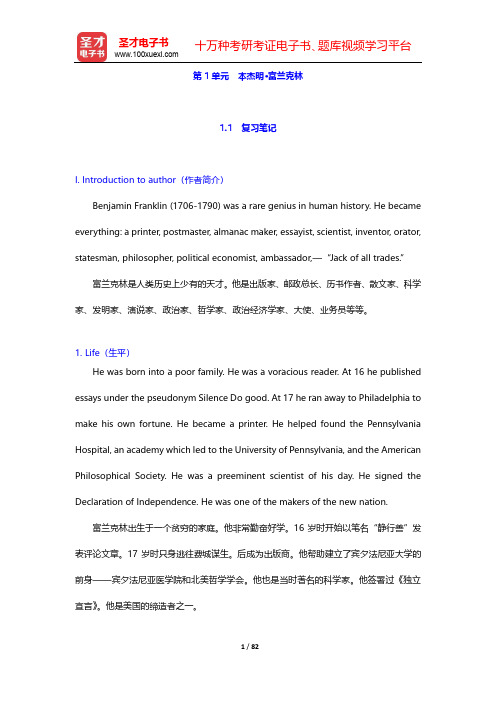
第1单元本杰明•富兰克林1.1 复习笔记I. Introduction to author(作者简介)Benjamin Franklin (1706-1790) was a rare genius in human history. He became everything: a printer, postmaster, almanac maker, essayist, scientist, inventor, orator, statesman, philosopher, political economist, ambassador,—“Jack of all trades.”富兰克林是人类历史上少有的天才。
他是出版家、邮政总长、历书作者、散文家、科学家、发明家、演说家、政治家、哲学家、政治经济学家、大使、业务员等等。
1. Life(生平)He was born into a poor family. He was a voracious reader. At 16 he published essays under the pseudonym Silence Do good. At 17 he ran away to Philadelphia to make his own fortune. He became a printer. He helped found the Pennsylvania Hospital, an academy which led to the University of Pennsylvania, and the American Philosophical Society. He was a preeminent scientist of his day. He signed the Declaration of Independence. He was one of the makers of the new nation.富兰克林出生于一个贫穷的家庭。
陶洁《美国文学选读》(第3版)章节题库-第三章至第四章【圣才出品】
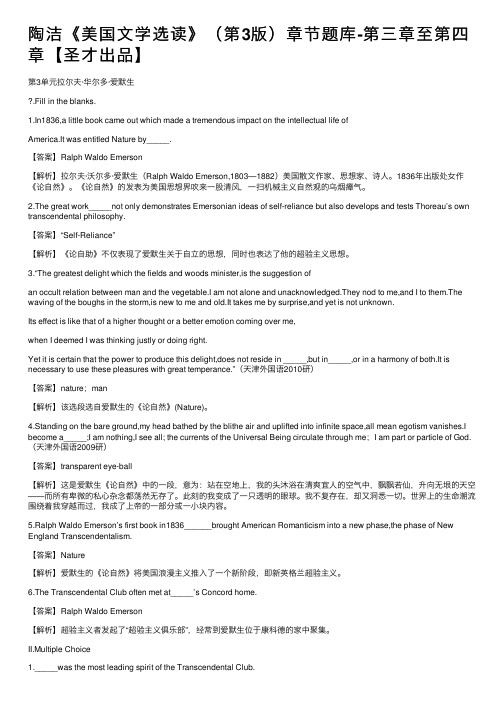
陶洁《美国⽂学选读》(第3版)章节题库-第三章⾄第四章【圣才出品】第3单元拉尔夫·华尔多·爱默⽣.Fill in the blanks.1.In1836,a little book came out which made a tremendous impact on the intellectual life ofAmerica.It was entitled Nature by_____.【答案】Ralph Waldo Emerson【解析】拉尔夫·沃尔多·爱默⽣(Ralph Waldo Emerson,1803—1882)美国散⽂作家、思想家、诗⼈。
1836年出版处⼥作《论⾃然》。
《论⾃然》的发表为美国思想界吹来⼀股清风,⼀扫机械主义⾃然观的乌烟瘴⽓。
2.The great work_____not only demonstrates Emersonian ideas of self-reliance but also develops and tests Thoreau’s own transcendental philosophy.【答案】“Self-Reliance”【解析】《论⾃助》不仅表现了爱默⽣关于⾃⽴的思想,同时也表达了他的超验主义思想。
3.“The greatest delight which the fields and woods minister,is the suggestion ofan occult relation between man and the vegetable.I am not alone and unacknowledged.They nod to me,and I to them.The waving of the boughs in the storm,is new to me and old.It takes me by surprise,and yet is not unknown.Its effect is like that of a higher thought or a better emotion coming over me,when I deemed I was thinking justly or doing right.Yet it is certain that the power to produce this delight,does not reside in _____,but in_____,or in a harmony of both.It is necessary to use these pleasures with great temperance.”(天津外国语2010研)【答案】nature;man【解析】该选段选⾃爱默⽣的《论⾃然》(Nature)。
陶洁《美国文学选读》(第3版)笔记和课后习题考研真题详解
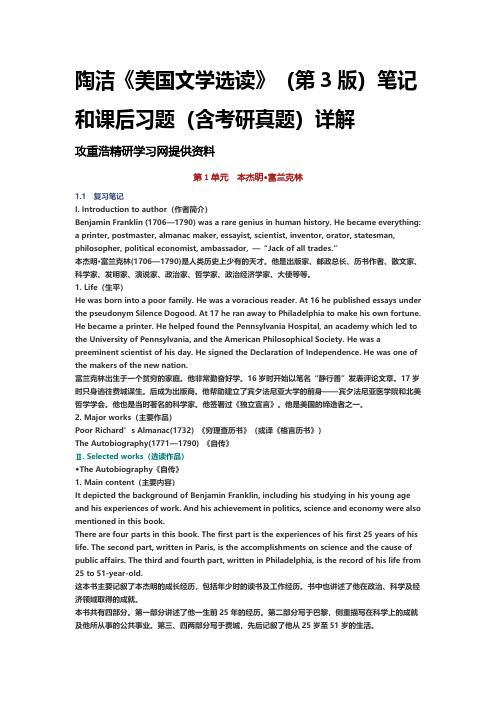
陶洁《美国文学选读》(第3版)笔记和课后习题(含考研真题)详解攻重浩精研学习网提供资料第1单元本杰明•富兰克林1.1复习笔记I.Introduction to author(作者简介)Benjamin Franklin(1706—1790)was a rare genius in human history.He became everything: a printer,postmaster,almanac maker,essayist,scientist,inventor,orator,statesman, philosopher,political economist,ambassador,—“Jack of all trades.”本杰明·富兰克林(1706—1790)是人类历史上少有的天才。
他是出版家、邮政总长、历书作者、散文家、科学家、发明家、演说家、政治家、哲学家、政治经济学家、大使等等。
1.Life(生平)He was born into a poor family.He was a voracious reader.At16he published essays under the pseudonym Silence Dogood.At17he ran away to Philadelphia to make his own fortune. He became a printer.He helped found the Pennsylvania Hospital,an academy which led to the University of Pennsylvania,and the American Philosophical Society.He was a preeminent scientist of his day.He signed the Declaration of Independence.He was one of the makers of the new nation.富兰克林出生于一个贫穷的家庭。
陶洁《美国文学选读》课后习题详解(拉尔夫 华尔多 爱默生)【圣才出品】
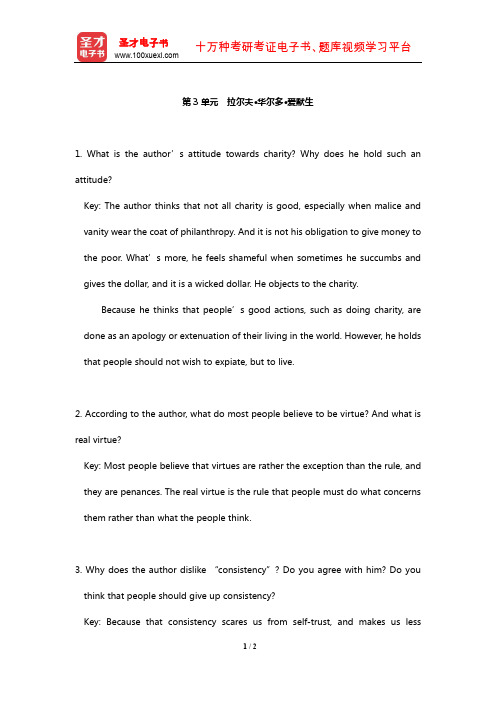
第3单元拉尔夫•华尔多•爱默生1. What is the author’s attitude towards charity? Why does he hold such an attitude?Key: The author thinks that not all charity is good, especially when malice and vanity wear the coat of philanthropy. And it is not his obligation to give money to the poor. What’s more, he feels shameful when sometimes he succumbs and gives the dollar, and it is a wicked dollar. He objects to the charity.Because he thinks that people’s good actions, such as doing charity, are done as an apology or extenuation of their living in the world. However, he holds that people should not wish to expiate, but to live.2. According to the author, what do most people believe to be virtue? And what is real virtue?Key: Most people believe that virtues are rather the exception than the rule, and they are penances. The real virtue is the rule that people must do what concerns them rather than what the people think.3. Why does the author dislike “consistency”? Do you agree with him? Do you think that people should give up consistency?Key: Because that consistency scares us from self-trust, and makes us lessconfident. It also makes us have a reverence for our past act or word because the eyes of others have no other data for computing our orbit than our past acts, and we are loath to disappoint them. What’s more, a foolish consistency is the hobgoblin of little minds, adored by little statesmen and philosophers and divines. And with consistency a great soul has simply nothing to do. It will ruin a man’s creativity.I cannot totally agree with him. Although I confess that there are some positive meanings in his proposal, I cannot neglect the positive aspects of consistency. Because that we sometimes need consistency to restrict people’s behaviors. For example, nature has its own law that we must follow, or we will violate the order of it.In my mind, whether people should give up consistency or not depends on the specific situation. That is, Keeping it firmly or giving it up is not wise choice. We should treat it case-by-case.4. What is the agreement of one’s actions? Why is it important for people? Key: The agreement of one’s actions is that the actions will be harmonious, no matter how unlike they seem.Because only with this agreement, can people be each honest and natural in their hour. Conformity explains nothing, and people’s genuine action will explain itself and their other genuine actions. So, it is important for people.。
【免费下载】美国文学选读 第三版 课后习题答案 陶洁
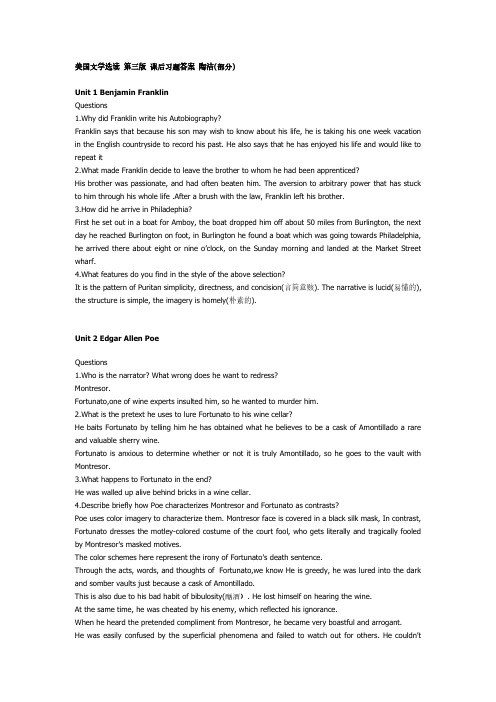
美国文学选读第三版课后习题答案陶洁(部分)Unit 1 Benjamin FranklinQuestions1.Why did Franklin write his Autobiography?Franklin says that because his son may wish to know about his life, he is taking his one week vacation in the English countryside to record his past. He also says that he has enjoyed his life and would like to repeat it2.What made Franklin decide to leave the brother to whom he had been apprenticed?His brother was passionate, and had often beaten him. The aversion to arbitrary power that has stuck to him through his whole life .After a brush with the law, Franklin left his brother.3.How did he arrive in Philadephia?First he set out in a boat for Amboy, the boat dropped him off about 50 miles from Burlington, the next day he reached Burlington on foot, in Burlington he found a boat which was going towards Philadelphia, he arrived there about eight or nine o’clock, on the Sunday morning and landed at the Market Street wharf.4.What features do you find in the style of the above selection?It is the pattern of Puritan simplicity, directness, and concision(言简意赅). The narrative is lucid(易懂的), the structure is simple, the imagery is homely(朴素的).Unit 2 Edgar Allen PoeQuestions1.Who is the narrator? What wrong does he want to redress?Montresor.Fortunato,one of wine experts insulted him, so he wanted to murder him.2.What is the pretext he uses to lure Fortunato to his wine cellar?He baits Fortunato by telling him he has obtained what he believes to be a cask of Amontillado a rare and valuable sherry wine.Fortunato is anxious to determine whether or not it is truly Amontillado, so he goes to the vault with Montresor.3.What happens to Fortunato in the end?He was walled up alive behind bricks in a wine cellar.4.Describe briefly how Poe characterizes Montresor and Fortunato as contrasts?Poe uses color imagery to characterize them. Montresor face is covered in a black silk mask, In contrast, Fortunato dresses the motley-colored costume of the court fool, who gets literally and tragically fooled by Montresor's masked motives.The color schemes here represent the irony of Fortunato's death sentence.Through the acts, words, and thoughts of Fortunato,we know He is greedy, he was lured into the dark and somber vaults just because a cask of Amontillado.This is also due to his bad habit of bibulosity(酗酒). He lost himself on hearing the wine.At the same time, he was cheated by his enemy, which reflected his ignorance.When he heard the pretended compliment from Montresor, he became very boastful and arrogant.He was easily confused by the superficial phenomena and failed to watch out for others. He couldn’ttolerate that others were stronger than him.For example, Montresor always stimulated him with Luchresi who was good at connoisseur(鉴赏)in wine.Under the impulse of vanity, he fell into Montresor’s terrible trap.In fact, he was careless and foolish and didn’t find that the danger was approaching him.He looked down upon Montresor and others.He didn’t realize his foolishness until the death was coming.Talking from the appearance, Monstresor was a well-educated and “kind” businessman.He enjoyed the honor and respect in the city. But in fact, he was an evil and awful person.His inner feelings were so cruel that they even made people tremble.Under his rich appearance was the dirty soul and despicable character.We couldn’t see any glorious virtues in his mind. Instead, his heart was cold and dark.It was the revenge that threw Montresor into the deep evil valley.unit 4 Nathaniel HawthorneQuestions :1.Why is the prison the setting of Chapter 1 ?No matter how optimistic the founders of new colonies may be, they are quick to establish a prison and a cemetery in their “Utopia,” for they know that misbehavior, evil, and death are unavoidable.This belief fits into the larger Puritan doctrine, which puts heavy emphasis on the idea of original sin—the notion that all people are born sinners because of the initial transgressions of Adam and Eve in the Garden of Eden. he is therefore using the prison building to represent the crime and the punishment which are aspect of civilized lifeWhat is the implication of the description of the roses?The rosebush symbolizes the ability of nature to endure and outlast man's activities.The narrator suggests that roses offer a reminder of Nature's kindness to the condemned; for his tale, he says, it will provide either a “sweet moral blossom” or else some relief in the face of unrelenting sorrow and gloom.2.Describe the appearance of Hester Prynne and the attitude of the people towards her.The second paragraph on page 30.The crowd in front of the jail is a mixture of men and women, all maintaining severe looks of disapproval.Several of the women begin to discuss Hester Prynne, and they soon vow that Hester would not have received such a light sentence for her crime if they had been the judges.One woman, the ugliest of the group, goes so far as to advocate death for Hester.3.What has happened to Hester?As a young woman, Hester married an elderly scholar, Chillingworth, who sent her ahead to America to live.While waiting for him, she had an affair with a Puritan minister named Dimmesdale, after which she gave birth to Pearl.The scarlet letter is her punishment for her sin and her secrecy.Why does she make the embroidery of the letter A so elaborate?It seems to declare that she is proud, rather than ashamed, of her sin.In reality, however, Hester simply accepts the “sin” and its symbol as part of herself, just as she accepts her child.And although she can hardly believe her present “realities,” she takes them as they are rather than resisting them or trying to atone for them.How does this tell us about her character?Throughout The Scarlet Letter Hester is portrayed as an intelligent, capable. It is the extraordinary circumstances shaping her that make her such an important figure.Unit5 Herman MelvilleQuestions1.What are the stories Ismael tells about Moby Dick?Ishmael compares the legend of Moby Dick to his experience of the whale.He notes that sperm whale attacks have increased recently and that superstitious sailors have come to regard these attacks as having an intelligent, even supernatural origin.In particular, wild rumors about Moby Dick circulate among whalemen, suggesting that he can be in more than one place at the same time and that he is immortal. Ishmael remarks that even the wildest of rumors usually contains some truth.Whales, for instance, have been known to travel with remarkable speed from the Atlantic to the Pacific; thus, it is possible for a whale to be caught in the Pacific with the harpoons of a Greenland ship in it. Moby Dick, who has defied capture numerous times, exhibits an “intelligent malignity”(狠毒)in his attacks on men2.Why does Ahab react so violently against the white whale?First, he lost one of his legs because of the white whale.Second,He considers Moby Dick the embodiment of evil in the world, and he pursues the White Whale,because he believes it his inescapable fate to destroy this evil.Ishmael suggests that Ahab is “crazy”and call him “a raving lunatic.” Do you agree with him? Why or why not?Ishmael describes Ahab as mad in his narration, and it does indeed seem mad to try to fight the forces of nature or God.3.What narrative features can you find in the selected chapter?In the selected charpter, Melville employed the technique of multiple view of his narrative to portray Moby Dick to achieve the effect of ambiguity and let readers judge the meaning.Unit 6 Henry David ThoreauQuestions1.Where indeed did Thoreau live, both at a physical level and at a spiritual level?He lived in a cabin on Walden Pond, which belonged to Emerson’s property.2.Had Thoreau ever bought a farm? Why did he enjoy the act of buying?No, he hadn’t.He avoided purchasing a farm because it would inevitably tie him down financially and complicate his life.Thoreau didn’t see the acquisition of wealth as the goal for human existence, he saw the goal of life to be an exploration of the mind and of the magnificent world around us.He regarded the places as an existence free of obligations and full of leisure.3.Is it significant that Thoreau mentioned the Fourth of July as the day on which he began to stay in the woods? Why?Yes, it is.Because The Fourth of July is known as Independence Day,the birthday ot the United States.Here Thoreau uses the day to express his beginning of regeneration at Walden.It also means a symbol of his conquest of being.4.How could you answer the question Thoreau asked at the end of this selection?Unit 7 19th Century American Poets1. Henry Wadsworth Longfellow(1) I Shot an Arrow…1. Why did the speaker lose sight of his arrow and song?The arrow flies too swiftly and too far away to be seen by the speaker; whereas the song is naturally invisible.2. In what circumstances did he find them again?He finds them unexpectedly years later from the trunk of a tree and the heart of a friend.3. What do arrow and song stand for in this poem?The images of arrow and song here may stand for friendship.(2) A Psalm of Life1. What kind of person is the speaker of this poem?The speaker is a man of action, always optimistic and cheerful, trying to achieve as much as possible in the short span of life.2. According to the poem, how should our lives be led to overcome the fact that each day brings us nearer to death?We should work harder and live happier.3. Interpret the metaphor of "Footprints on the sand of time" (line 28).The metaphor refers to human deeds in real life.2. Walt Whitman(1)One's Self I Sing1. What is the significance of singing about one's self?It is an exaltation of the individual spirit, which is typical of American people.2. What is the difference between physiology and physiognomy?Physiology is a science that deals with the functions and life process of human beings, whereas physiognomy refers to an art of judging character from contours of face itself or the appearance of a person.3. What does Whitman mean by the term of "the Modern Man"?He means that a man should be free from any prejudice and pride, totally different from the traditional one, that is full of bias.(3) O Captain! My Captain!1. Why is the word "Captain" capitalized throughout the poem?In this poem the word “Captain” specially refers to Abraham Lincoln, president of the United States. 2. What overall metaphor does the poet employ in this poem?Life is a journey.3. Why do people on the shores exult and bells ring, while the speaker remains so sad?They welcome the ship returning from its hard trip, whereas the speaker is sad because the captain fails to receive his own honor.3.Emily Dickinson(1) To Make a Prairie …1. What things are needed to "make" a prairie? In what sense can one really do it?Some grass and insects and small animals. People can make a prairie with their imagination.2. How can "revery alone" create a prairie?The prairie stays in one's mind.(2) Success Is Counted Sweetest1. Why is success "counted sweetest by those who ne'er succeed"?Those who have tasted the bitterness of failure would have a keener desire for success.2. Who are "the purple host"?The so-called successful people in the world.3. Who is "he" in the last stanza?Anyone who is pursuing his success.(3) I'm Nobody!1. Who are the "pair of us" and "they" in this poem? The "pair of us" refers to the speaker in the poem and the reader, and "they" refers to the public, especially those in power.2. What does "an admiring bog" really mean?" (line 28).It Implies the vain and empty common people, who are always admiring and pursuing the celebrities.3. What is the theme of this poem?The real admirable life is a secluded and common one.4. Do you want to be "nobody" or "somebody"? Explain your reasons.Different persons would have different answers to this question. Personally, I prefer to be nobody. Unit 8 Mark TwainQuestions1: Why do you think Mr.Wheeler is so eager to tell these stories?From Mr.Wheeler’s behaviors and contents of his narration we can know he is so eager to tell these stories.First, when "I" asked him to tell "me" something about W.Smiley, he “ backed me into a corner and blockaded me with his chair, and then sat down and reeled off the narrative”. And during theprocess of telling his stories, he never paid any attention to others'response to his story and just went on telling what amused him. At last when the listener felt boring and wanted to leave, Mr.Wheeler even didn't notice it and still asked him to sit there listening to him.Question2: Does his audience share his enthusiasm in telling the stories? No. the audience does not show any interest in Mr.Wheeler’ stories. In fact, the narrator was very feverish about his stories, but ,in the eyes of the listener,the stories were very boring and had nothing to do with his preoccupation. As an educated man, the listener couldn't understand the way of laborers for joy, and he would never bother himself to understand it. So after the long time of Mr.Wheeler’ solo narration and when the audience got a chance, he fled away.Question3: Do you think the narrator and his listener ever suspect the presence of humor? Why? How do you interpret their interactions? The narrator and his listener never noticed or suspected the presence of humor.During the intercourse,the narrator went vigorously on his monotonous narrative "wihout a little smiling" talking about the animals and the things like ,while the listener felt rather puzzled or bothered by his stories.It seemed to be kind of coarse things. So the two different scenes go on separately without a intersection.And their interaction was a complete failure according toour common sense about communication.But it in this sense produced the effect of humor which can be tasted by our readers due to the skills adopted by Mark Twain .Unit 14 F·Scott Fitzgerald1.Do you think Gatsby deserves to be called “the great”? Why?(1)I think it is too complicated to simply say Gatsby deserves to be ―great‖ or not.For one thing, Gatsby was ambitious, hardworking, generous and passionate. He was so extremely loyal to his love and Daisy that he could do anything to get Daisy back: he did shady business to earn money and social position; he threw luxurious parties just to draw Daisy’s attention; he could take the blame for a death that he did not cause.(2)In this respect, he is much ―greater‖ than his contemporaries. For another thing, Gatsby never realized that Daisy wasn’t the girl he loved anymore. Gatsby was so innocent that he staked everything on his dreams, not realizing that his dreams are unworthy of him. He wasn’t sober enough to be great.2.Does “the green light” Gatsby believed in exist in reality? Why or why not ?(1)I think ―the green light‖ does not exist in reality. Because the green light which situated at the end of Daisy’s East Egg dock and barely visible from West Egg lawn represents Gatsby’s unattainable dream. Although the color itself can be seen as hope and bright future, Gatsby’s quest for Daisy back is doomed to be impossible. Daisy lived in ―a material world without being real, where poor ghosts, breathing dream like air‖.(2)After five years when Gatsby met Daisy again, the miracle Daisy had lost her original glory. Therefore, there is no delaying that Gatsby’s dream would not come true. In the novel, the green light not only represents that innocent Gatsby looked forward to the future, but also means his longing for the history –his happy past with Daisy. The distinction between ideal and reality was huge. As if American dream between golden past and golden future always suffered from the realistic betrayal and crush.3.What does Gatsby’s Schedule reveal about him and how does it relate to the American Dream?(1)The schedule is a reflection of Gatsby’s determination and ambition. It reveals that he is hard on himself in pursuit of his goal—to be an upper-class man.(2)On one hand, we can know that he is persistent in pursuing his American Dream-- to attain wealth and happiness through his struggle. On the other hand, he is too idealistic and naive.(3)He tries his best to make money and learns everything required to be an upper-class man so that he can get access to his beloved girl.Money is important,but there are other barriers difficult to penetrate. The girl he loves is as vulgar and superficial as others in her circle, she is unable to meets Gatsby’s romantic fantasy. So his dream is destined to shatter, which indicates the disillusion of American Dream.4.When you read the line “He (the man with owl-eyed glasses) took off his glasses and wiped them again, outside and in ,” what images does it create in your mind, given the novel’s numerous references to the strikingly strange scene of the spectacled eyes?(1)From this line , superficially, owl-eyes is a person with thick and blurry glasses who can not see clearly all the things in the world. However, we know he is actually an owl-wise observer and sees more clearly than anyone else in the novel. Owl-Eyes, except Nick, is the only friend to appear at the rain-soaked burial of Gatsby, when others are unwilling to come. He feels sympathy for Gatsby’s tragedy.(2)After reading this line, I cannot help thinking of the Dr.Eckleburg billboard with its huge yellow spectacles in this novel. In many rainy days, Dr. Eckleburg’s eyes are also dimmed and seem blind. But in fact this is a pair of "all-seeing" eyes. The Owl-Eyed Man is similar to Dr. Eckleburg, sadly looking at the people’s life and idealism of this time. Both of them symbolize an uninvolved spectator god. They watch all the activities of the humans. Owl-eyes is the avatar of the sightless Dr. Eckleburg.Unit 16 Ernest Hemingway1. How do you interpret the irony of the title after reading the story?(1)The title ―A Clean Well-Lighted Place‖ refers to the café in the text. The café was very clean and well- lighted. From the literary meaning, we may feel this place was very warm and comfortable, was a place where people need warmth wanted to go. So the old man, who was rich but deaf and lonely came here to find warmth and avoided nada. It was the only place he could go and could findsome comfort.(2)However, the younger waiter was very selfish. As his wife was waiting him on the bed, he wanted to go home early. Therefore, he refused to offer the old man another cup of wine by the excuse that the business was finished. In fact, there was still an hour from closing time. The younger thought an hour was more important to him than to the old man. The old man needed to leave the only place where he could get far away from nada/ nothing. This café should be warm but the younger waiter forced the lonely and deaf to leave without any sympathy. This is the irony of the title.2. Do you think youth and confidence can help one withstand the metaphorical dark?Why or why not? (1)I don’t think so.In our opinion, the metaphorical dark means nada,nothing in one’s inner heart. In the article, the younger waiter had both youth and confidence; however, he never made full use of them. As we can see, he didn’t understand the old man’s suicide and excessive drinking, and failed to see his tomorrow through the old man’s present situation.(2)What’s more, he had no idea that youth is not permanent, which cannot guarantee love and work. From above, there is no denying that he didn’t realize his nada. Therefore, his youth and confidence never contributed to withstanding his metaphorical dark.(3)I think that, nowadays, youth and confidence do can help to withstand the metaphorical dark, for one can bravely face the reality and overcome the nada with youth and confidence. But they only serve as two main factors. In fact, we need some other factors such as courage, dignity and so on if we want to withstand the metaphorical dark successfully.3.The older waiter said to the younger waiter:“We are of two different kinds.” In what way do you think they are different?(1)I think they are different from each other in the following four aspects:In the beginning, they are in different ages.The older waiter was in his middle age; while the other was much younger.(2)Then, they have different attitudes towards the old man. From the article, we know the older waiter had suffered a lot. He had maintained a clean and well-lighted place in his heart, and he could understand the old man and show sympathy to him. However, the young man was very selfish. He wanted to go home early so that he finished the business one hour earlier and forced the old man to leave. He showed hatred rather than sympathy to the old man.(3)Next, they have different attitudes towards life. The older waiter had a deep sense of life. He was brave and wanted to fight again nada. Besides, he cared about others. The younger one was totally different; he has a shadow understanding of life. He satisfied with his present love and work, he only care about himself and was reluctant to take others into consideration. He even never thought of his future.(4)Finally, they have different attitudes towards nada. The older waiter had realized that it is impossible to avoid nada in one’s whole life. The only thing he can do is to keep a kind of clearness in his own mind. So he was willing to work late for the lonely old man and was pleased to help those who are suffering nada. But out of youth and confidence, he failed to overcome nada. On the contrary, the younger waiter had the two most important factors for withstanding nada; however, he didn’t realize the nada in his heart at all. Then his youth and confidence became useless.Unit 17 20th -Century American Poets1. Ezra Pound In A Station of the Metro1. Why does the poet call the faces of pedestrians "apparition"?These pedestrians are all walking in a hurry amidst the drizzling rain.2. What do "petals" and "bough" stand for? Petals refer to the faces while the bough stands for the floating crowd.2. Wallace Stevens Anecdote of the Jar1. What does the jar in poem symbolize? Why does the speaker place it on top of a hill? The jar here symbolizes a certain perspective on looking at this world. If the perspective of the viewing is creative and unique, it will change the conventional order of the old world. When a new perspective comes out, it will certainly hold attention from the rest.2. The jar is "round" and "of a port in air," meaning that it has a stately importance. What effect does it have on surroundings when placed on the ground? Maybe the round jar assumes the air of a domineering figure, which helps to form a certain order out of the disordered surrounding.3. How did the wilderness of Tennessee characterized? What words or phrases does the poet use to describe it? Tennessee seems to a place full of life and energy. “Slovenly,” “sprawl” and “wild” are some of the words used to describe the place. (See Anecdote of the Jar )4.Robert Frost(1)Fire and Ice1. What are the symbolic meanings of fire in this poem? Fire symbolizes natural disaster, human passion, as well as war.2. Why does the speaker say that ice is also great for destruction? Explain what ice stands for here. Ice, oppose to fire, is also a dreadful natural disaster in this world, and ice is always related to indifference, coldness, hatred, and the other negative sentiments of human beings.3. What is your opinion about fire and ice? Which one is more destructive? Both fire and ice can destroy this beautiful world if they are beyond control of human beings. Therefore we should be open-minded and reduce our prejudice and pride so as to keep this world in peace.(2)Stopping By Woods On a Snowy Evening1. In your opinion, what was the reason that made the speaker stop by the woods on a snowy evening? The poet was deeply attracted by the natural beauty of the scene at that very moment.2. Why did the horse give the harness bell a shake? The horse grew impatient by stopping in the middle of the dark, cold woods at midnight. It was eager to go home.3. Why couldn't the speaker stay longer by the woods to appreciate its mysterious beauty? He realized that it was late at night and he would have to hurry home to get some food and sleep, because the next morning he would have a lot of work to do.4. What is the effect of repetition in the last two lines? The refrain-like repetition in the last two lines reminds the reader a simple fact of life: whatever happens, one must go forward in the journey of his or her life.(3) The Road Not Taken1. What is the speaker's initial response to the divergence of the two roads? The speaker is at a loss which road he should choose, and he feels sorry that he cannot explore both roads at the same time.2. Describe the similarities and differences of these two roads. Which one does the speaker take? Two roads are similar except one of them is more “grassy,” which implies that it is less traveled by people. The speaker prefers the less traveled one, because he likes adventure.3. What might the two roads stand for in the speaker's mind? One road stands for the traditional one and the other is unconventional one and full of challenges and difficulties. To follow other people's footsteps or to open a new road for himself is really not an easy decision for us to make in our lives.Unit22 Allen GinsbergAll through the poem, the speaker is addressing to Walt Whitman. Is this poem about Walt Whitman or about modern America?-----from Allen Ginsberg A Supermarket in CaliforniaThe author in this poem wanted to emphasis his theme about showing his respect to the passed age and showing his worry about the corrupt in the part of spirit and society. As we all know, Walt Whitman’s poetry was a revolution in American literature can be seen in the first publication of Leaves of Grass in 1855. His poetry is “free verse” in that the lack of meter and rhyme is known as his major technical innovation. Allen Ginsberg had a highly praise on him. As the movement of Beat Generation, Allen Ginsberg used poetry as weapon to express his own understanding of Beat---beatific and beat down.In this poem, the author wrote the sentence “shopping for images”. What he wanted to buy is the things which were listed by Walt Whitman many years ago. What is in the supermarket? The fresh fruits on the shelf fit the needs of customers and the families. We across a strange statement: shopping for images. How can we shop for images? What he refers to us is still the pure image---“dreaming of your enumerations”. The things on the shelf are the images of languages in Walt Whitman’s poetry. The language in Walt Whitman’s poetry and the spirit in his poetry are the things which Allen Ginsberg dreamed of. A young America which is full of energy is worth being praised. Allen Ginsberg found the song of himself, the song full of courage and the echo of the real world among Walt Whitman’s work. The meaning of age in this poem is that the nation or the race opens the age which belongs to them and creates the history of them own. To a certain extend, the age singer equals the national singer. The world is the world which has its features of timing and events. This means that the link of combining the world is not the same as the goods on the shelf but the things which contain the world and individual spirits.There is a difference between Walt Whitman’s poetry and the successor’s poetry.The former poetry focused on the point of the combing of the poetry and the real world. It extended the full of fruit of the history through he understood the meaning of lives living on earth.The latter’s poetry showed that the nature of material has been deprived from the former world. Our moral and spirit has become the goods in the supermarket or the desire in every family in the capitalism nations. Allen Ginsberg recalled the dream of poetry and moral in Walt Whitman’s age.In this poem, Allen Ginsberg imaged Walt Whitman passing through the death to come to the age which was so called the Golden Age of America. What he can see? How can he do? Would he care about the price and market’s conditions as the American middle-aged women? Allen Ginsberg follows Walt Whitman in the supermarket, but never reached the collection office. They did not like the goods which had been deprived the nature of them but pursuit the things which existed front their eyes and enjoyed the pleasure of nature.。
陶洁《美国文学选读》课后习题详解(纳撒尼尔 霍桑)【圣才出品】
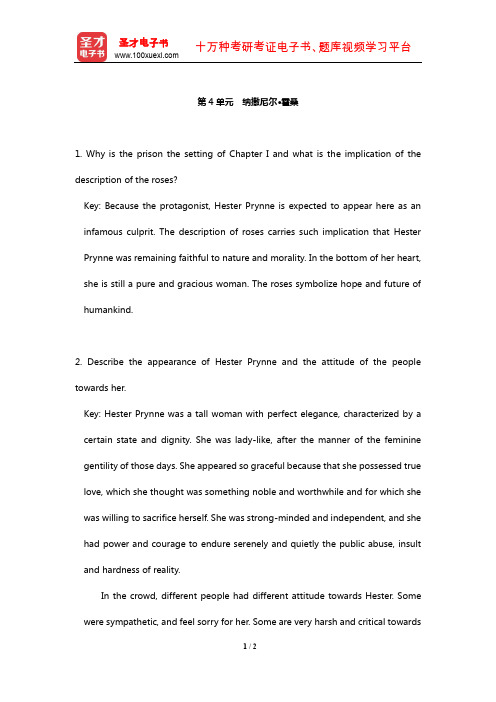
第4单元纳撒尼尔•霍桑1. Why is the prison the setting of Chapter I and what is the implication of the description of the roses?Key: Because the protagonist, Hester Prynne is expected to appear here as an infamous culprit. The description of roses carries such implication that Hester Prynne was remaining faithful to nature and morality. In the bottom of her heart, she is still a pure and gracious woman. The roses symbolize hope and future of humankind.2. Describe the appearance of Hester Prynne and the attitude of the people towards her.Key: Hester Prynne was a tall woman with perfect elegance, characterized by a certain state and dignity. She was lady-like, after the manner of the feminine gentility of those days. She appeared so graceful because that she possessed true love, which she thought was something noble and worthwhile and for which she was willing to sacrifice herself. She was strong-minded and independent, and she had power and courage to endure serenely and quietly the public abuse, insult and hardness of reality.In the crowd, different people had different attitude towards Hester. Some were sympathetic, and feel sorry for her. Some are very harsh and critical towardsher, especially those cold-hearted, middle-aged women. They expressed their hatred towards Hester because they thought that Hester has brought shame on them. Even there were some people thought that the present punishment was too mild, and death should be the just penalty.3. What has happened to Hester? Why does she make the embroidery of the letterA so elaborate? How does this tell us about her character?Key: Hester has offended the Puritan rule, sinned, guilty of adultery. Condemned to wear on the breast of her gown the scarlet letter “A”, she was to stand on the platform before the meeting so that her shame might be a warning and a reproach to all who saw her.She makes the letter “A” so elaborate out of her true love for Dimmesdale. She is loyal to her true lover, faithful to morality, honest to herself. She becomes strong and independent in psychology, generous in action, living a life with dignity and great fortitude.。
陶洁《美国文学选读》课后习题详解(亨利 大卫 梭罗)【圣才出品】
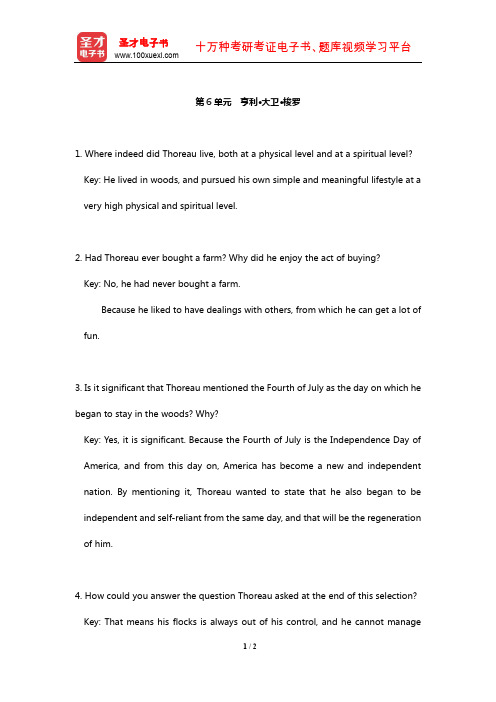
第6单元亨利•大卫•梭罗1. Where indeed did Thoreau live, both at a physical level and at a spiritual level? Key: He lived in woods, and pursued his own simple and meaningful lifestyle at a very high physical and spiritual level.2. Had Thoreau ever bought a farm? Why did he enjoy the act of buying?Key: No, he had never bought a farm.Because he liked to have dealings with others, from which he can get a lot of fun.3. Is it significant that Thoreau mentioned the Fourth of July as the day on which he began to stay in the woods? Why?Key: Yes, it is significant. Because the Fourth of July is the Independence Day of America, and from this day on, America has become a new and independent nation. By mentioning it, Thoreau wanted to state that he also began to be independent and self-reliant from the same day, and that will be the regeneration of him.4. How could you answer the question Thoreau asked at the end of this selection? Key: That means his flocks is always out of his control, and he cannot managethem effectively. The shepherd will be disturbed and annoyed by them rather than get some pleasure from feeding and raising them. The shepherd’s life will be a mess.。
陶洁《美国文学选读》课后习题详解(弗 斯科特 菲茨杰拉德)【圣才出品】
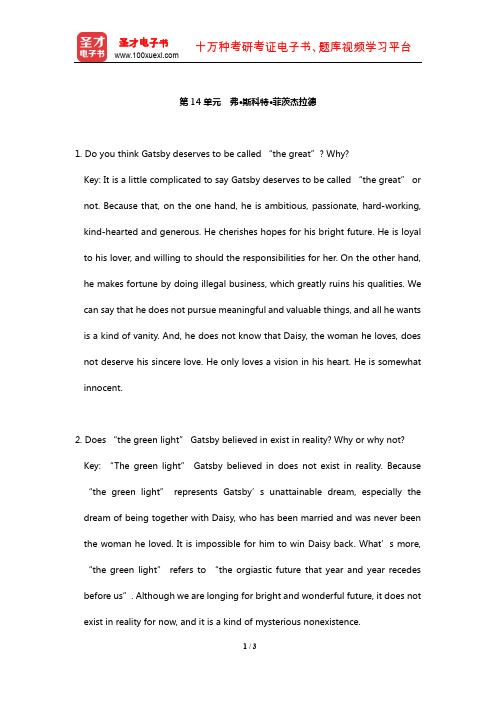
第14单元弗•斯科特•菲茨杰拉德1. Do you think Gatsby deserves to be called “the great”? Why?Key: It is a little complicated to say Gatsby deserves to be called “the great” or not. Because that, on the one hand, he is ambitious, passionate, hard-working, kind-hearted and generous. He cherishes hopes for his bright future. He is loyal to his lover, and willing to should the responsibilities for her. On the other hand, he makes fortune by doing illegal business, which greatly ruins his qualities. We can say that he does not pursue meaningful and valuable things, and all he wants is a kind of vanity. And, he does not know that Daisy, the woman he loves, does not deserve his sincere love. He only loves a vision in his heart. He is somewhat innocent.2. Does “the green light” Gatsby believed in exist in reality? Why or why not? Key: “The green light” Gatsby believed in does not exist in reality. Because “the green light” represents Gatsby’s unattainable dream, especially the dream of being together with Daisy, who has been married and was never been the woman he loved. It is impossible for him to win Daisy back. What’s more, “the green light” refers to “the orgiastic future that year and year recedes before us”. Although we are longing for bright a nd wonderful future, it does not exist in reality for now, and it is a kind of mysterious nonexistence.3. What does Gatsby’s Schedule reveal about him and how does it relate to the American Dream?Key: Gatsby’s schedule reveals his ambitions and determination to be successful. He is strict with himself and has a sense of self-control. In order to gain wealth and social statues, he made himself such a detailed and meticulous schedule. It is the very American Dream, to gain wealth and statues, that drives him to make his schedule and work hard regardless of what kind of means he uses to make it come true.4. When you read this line “He (the man with owl—eyed glasses) took off his glasses and wiped them again, outside and in,” what image does it crea te in your mind, given the novel’s numerous references to the strikingly strange scene of the spectacled eyes?Key: When I read this line, I think that the man with thick and blurry owl-eyed glasses cannot see clearly all the things in the world. However, he is actually an owl-wise observer and sees more clearly that anyone else in the novel. This man, except Nick, is the only friend to appear at the funeral of Gatsby. He is a man of sympathetic. Throughout this novel, we also find that Dr. Eckleburg billboard also has its huge yellow spectacles. In many rainy days, Dr. Eckleburg’s eyes are also dimmed and seem blind. But, in fact, it is a pair of “all-seeing” eyes, observing what happens in the world. The owl-eyed man is similar to Dr. Eckleburg, sadlylook ing at the people’s life and idealism of this time. Both of them symbolize an uninvolved spectator, the God.。
陶洁《美国文学选读》(第3版)笔记和课后习题(含考研真题)详解-第1~6单元【圣才出品】
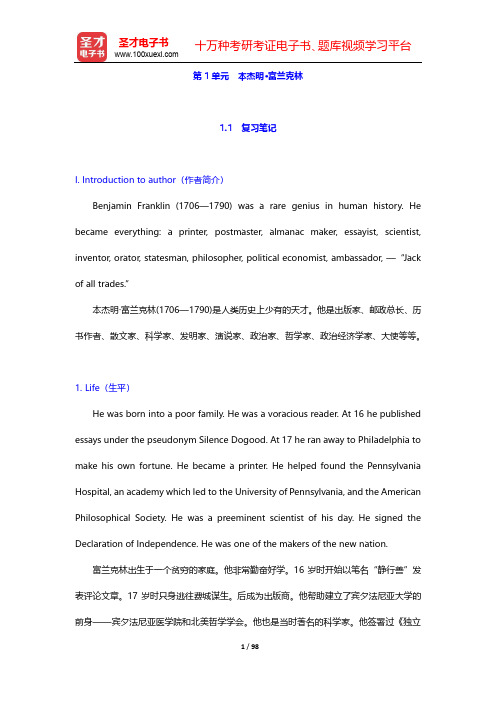
第1单元本杰明•富兰克林1.1 复习笔记I. Introduction to author(作者简介)Benjamin Franklin (1706—1790) was a rare genius in human history. He became everything: a printer, postmaster, almanac maker, essayist, scientist, inventor, orator, statesman, philosopher, political economist, ambassador, —“Jack of all trades.”本杰明·富兰克林(1706—1790)是人类历史上少有的天才。
他是出版家、邮政总长、历书作者、散文家、科学家、发明家、演说家、政治家、哲学家、政治经济学家、大使等等。
1. Life(生平)He was born into a poor family. He was a voracious reader. At 16 he published essays under the pseudonym Silence Dogood. At 17 he ran away to Philadelphia to make his own fortune. He became a printer. He helped found the Pennsylvania Hospital, an academy which led to the University of Pennsylvania, and the American Philosophical Society. He was a preeminent scientist of his day. He signed the Declaration of Independence. He was one of the makers of the new nation.富兰克林出生于一个贫穷的家庭。
美国文学选读考研教材练习题库
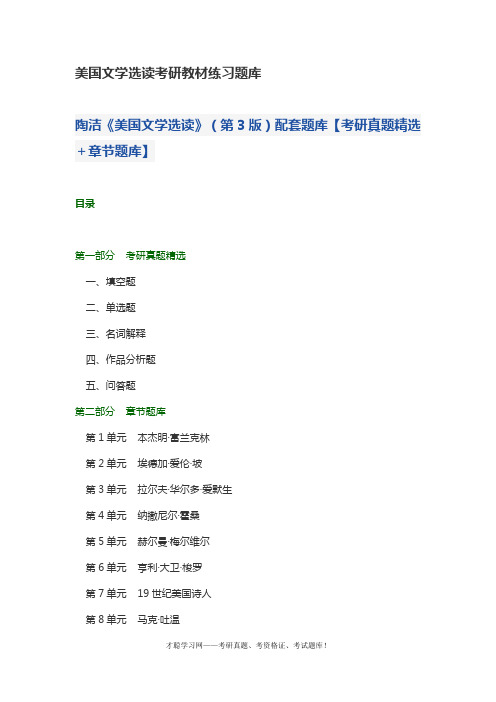
美国文学选读考研教材练习题库陶洁《美国文学选读》(第3版)配套题库【考研真题精选+章节题库】目录第一部分考研真题精选一、填空题二、单选题三、名词解释四、作品分析题五、问答题第二部分章节题库第1单元本杰明·富兰克林第2单元埃德加·爱伦·坡第3单元拉尔夫·华尔多·爱默生第4单元纳撒尼尔·霍桑第5单元赫尔曼·梅尔维尔第6单元亨利·大卫·梭罗第7单元19世纪美国诗人第8单元马克·吐温第9单元亨利·詹姆斯第10单元斯蒂芬·克莱恩第11单元薇拉·凯瑟第12单元舍伍德·安德森第13单元凯萨琳·安·波特第14单元弗·斯科特·菲茨杰拉德第15单元威廉姆·福克纳第16单元厄内斯特·海明威第17单元20世纪美国诗人(1)第18单元尤金·格拉斯通·奥尼尔第19单元埃·布·怀特第20单元田纳西·威廉斯第21单元拉尔夫·华尔多·埃利森第22单元20世纪美国诗人(2)第23单元阿瑟·米勒第24单元索尔·贝娄第25单元约瑟夫·海勒第26单元托尼·莫里森第27单元路易丝·厄德里克•试看部分内容考研真题精选一、填空题1. In his autobiography, _____creates the image of a self-made man and demonstrates his belief that the new world of America was a la nd of _____which might be met through hard work and wise manag ement.[天津外国语学院2011研]【答案】Benjamin Franklin, opportunities查看答案【解析】富兰克林是美国启蒙时期与独立战争时期的代表人物。
陶洁《美国文学选读》课后习题详解(19世纪美国诗人)【圣才出品】
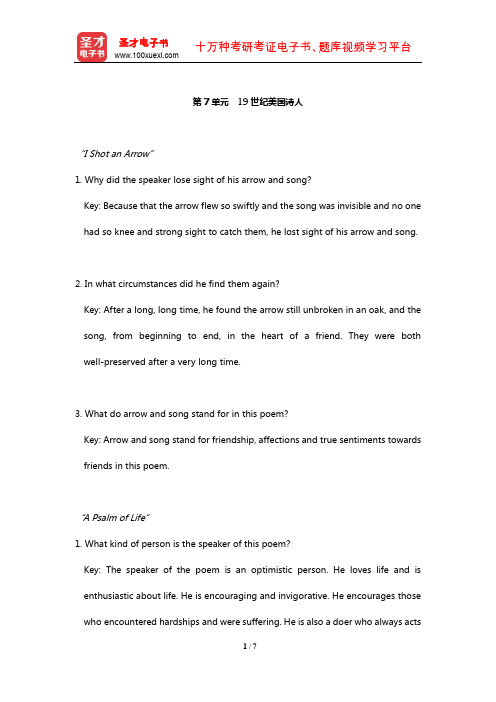
第7单元19世纪美国诗人“I Shot an Arrow”1. Why did the speaker lose sight of his arrow and song?Key: Because that the arrow flew so swiftly and the song was invisible and no one had so knee and strong sight to catch them, he lost sight of his arrow and song.2. In what circumstances did he find them again?Key: After a long, long time, he found the arrow still unbroken in an oak, and the song, from beginning to end, in the heart of a friend. They were both well-preserved after a very long time.3. What do arrow and song stand for in this poem?Key: Arrow and song stand for friendship, affections and true sentiments towards friends in this poem.“A Psalm of Life”1. What kind of person is the speaker of this poem?Key: The speaker of the poem is an optimistic person. He loves life and is enthusiastic about life. He is encouraging and invigorative. He encourages those who encountered hardships and were suffering. He is also a doer who always actsrather than yearns for future and makes plan for it. He knows that a person should “be up and doing, with a heart for any fate” and keep achieving and pursuing, and learning to labor and wait.2. According to the poem, how should our lives be led to overcome the fact that each day brings us nearer to death?Key: According the poem, “life is real, life is earnest! And the grave is not its goal.” Although we go towards death every day, it is not our destination, for the aim of life of ours is to pursue, achieve and improve ourselves. That is, “but to act, that each tomorrow / Find us farther than today.” So, we should“Be a hero in the strife” and “act in the living present!”3. Interpret the metaphor of “Footprints on the sand of time” (line 28).Key: “The sand of time”refers to the lifetime of a man. If a man has done nothing and achieved nothing, his whole life would be empty and worthless. There was no any “footprints”. “Footprints on the sand of time” refers a person’s traces of struggle and his ac hievement recognized by others.“Sonnet-To Science”1. What kind of image does science have in this poem?Key: According to the poem, science is “the daughter of Old Time” and changes all things with its “peering eyes”. It becomes formidable adversary toimagination and poetry, because it stops the poets’ wandering in the jeweled shies.2. According to Poe, what will a poet do, if he is free from the bondage of science? Key: If a poet is free from the bondage of science, he will wander in the jeweled skies to seek treasure, that is, writing materials, for his poems, and have the summer dream beneath the tamarind tree so as to send his imaginations fly.3. What might science deprive the speaker of?Key: Science might deprive the speaker of “wandering” and “the summer dream beneath the tamarind tree”, because science, like a vulture, preys “upon the poet’s heart” and it also ruins many beautiful legends. Science explains everything in a scientific way, leaving poets no place to imagine and wander. In the end, the speaker even cannot dream under the tamarind tree.“To Helen”1. Why does the poet compare Helen’s beauty to “those Nicean barks of yore”? Key: Because the poet thinks that Helen is a classical beauty and “those Nicean barks of yore” implies the same kind of beauty, which is gentle, dreamy and heart-shaking.2. What have brought the wayfaring speaker home?Key: Helen’s “hyacinth hair, classic face and Naiad airs” have brou ght the wayfaring speaker home.3. In what form does Helen appear in the final stanza? Why does she carry a lamp in her hands?Key: She stands “in yon brillia nt window-niche” like a statue.Because now, she appears in the incarnation of Psyche, who was very curious about his husband and carried a lamp to see him. And here, the poet reproduces the classic scene of the mythology so as to make Helen mysterious.One’s Self I Sing1. What is th e significance of singing about one’s, self?Key: Singing about one’s self is celebrating human beings’ individual spirit, which is typical of American people. This exaltation puts mankind at the first place and increases their confidence and self-esteem.2. What is the difference between physiology and physiognomy?Key: Physiology is a science that deals with the functions and life process of human beings, whereas physiognomy refers to an art of judging character from contours of face itself or the appearance of a person.3. What does Whitman mean by the term of “the Modern Man”?Key: He means that “the Modern Man” should be free from any prejudice and pride, totally different from the traditional one who is full of bias. The life of “the Modern Man” is full of passion, pulse and power, and people’s action are cheerful and freest under the divine laws.“O Captain! My Captain!”1. Why is the word “Captain” capitalized throughout the poem?Key: Because, in this poem, the word “Captain” especially refers to Abraham Lincoln, president of the United States.2. What overall metaphor does the poet employ in this poem?Key: The poet compares America to be the ship on the sea, and the sea symbolizes the Civil War of America. President, Abraham Lincoln, is compared to be the “Captain”, who is killed just before the victory.3. Why do people on the shores exult and bells ring while the speaker remains so sad?Key: Because people on the shore welcome the ship returning from its hard trip, whereas the speaker is sad because the captain fails to receive his own honor.“To Make a Prairie”1. What things are needed to “make” a prairie? In what sense can one really do it?Key: It needs grass and insects. One can really do it by imagination.2. How can “revery alone” create a prairie?Key: By imagination, everything on a prairie can come into our mind, and thus, we can create a prairie.“Success Is Counted Sweetest”1. W hy is success “counted sweetest by those who never succeed”?Key: Because those who never succeed have a strong desire to succeed and they think that being successful is the most meaningful and worthy thing that they pursue. For them, success is the most attractive goal and is counted sweetest.2. Who are “the purple host”?Key: “The purple host” refers to those so-called successful people in the world.3. Who is “he” in the last stanza?Key: “He” refers to anyo ne who is pursuing his success.“I’m Nobody!”1. Who are the “pair of us” and “they” in this poem?Key: The “pair of us” refers to the speaker in the poem and the reader. “They” refers to the public, especially those in power.。
陶洁《美国文学选读》课后习题详解(埃德加 爱伦 坡)【圣才出品】
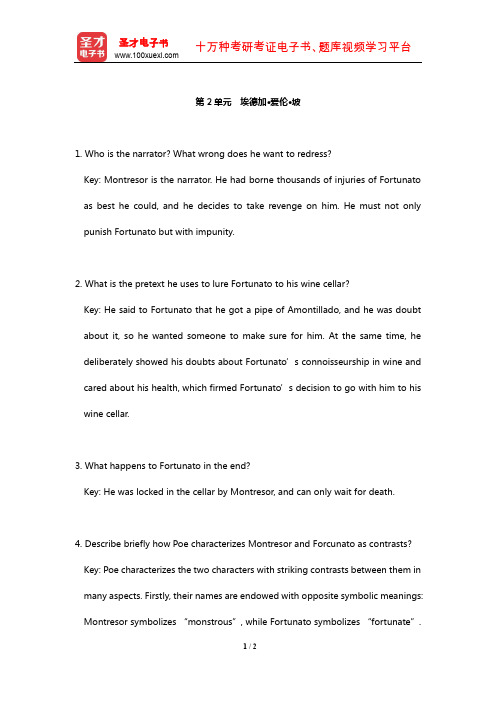
第2单元埃德加•爱伦•坡1. Who is the narrator? What wrong does he want to redress?Key: Montresor is the narrator. He had borne thousands of injuries of Fortunato as best he could, and he decides to take revenge on him. He must not only punish Fortunato but with impunity.2. What is the pretext he uses to lure Fortunato to his wine cellar?Key: He said to Fortunato that he got a pipe of Amontillado, and he was doubt about it, so he wanted someone to make sure for him. At the same time, he deliberately showed his doubts about Fortunato’s connoisseurship in wine and cared about his health, whi ch firmed Fortunato’s decision to go with him to his wine cellar.3. What happens to Fortunato in the end?Key: He was locked in the cellar by Montresor, and can only wait for death.4. Describe briefly how Poe characterizes Montresor and Forcunato as contrasts? Key: Poe characterizes the two characters with striking contrasts between them in many aspects. Firstly, their names are endowed with opposite symbolic meanings: Montresor symbolizes “monstrous”, while Fortunato symbolizes “fortunate”.Montresor is the devil in the story, and Fortunato is fortunate through his life and makes great fortune, but finally, he ends in a very unfortunate way, which is very ironical. Secondly, their clothes are very different: Fotrtunato “wore motley”, while Montresor put on “a mask of black silk” and drew “a roquelaire” closely about his person. Last, their psychological activities and consciousness are in contrast: Montresor knows clearly what is going on and what will happen, while Fortunato is always kept in the dark till the end.。
陶洁《美国文学选读》(第3版)笔记和课后习题详解(第1单元 本杰明
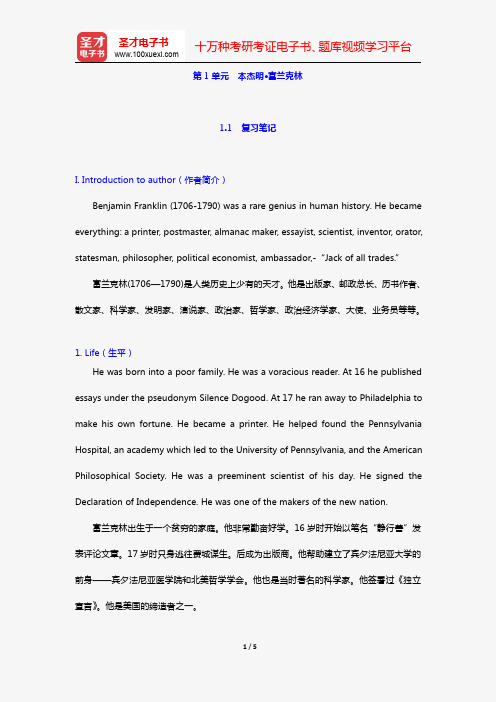
第1单元本杰明•富兰克林1.1复习笔记I.Introduction to author(作者简介)Benjamin Franklin(1706-1790)was a rare genius in human history.He became everything:a printer,postmaster,almanac maker,essayist,scientist,inventor,orator, statesman,philosopher,political economist,ambassador,-“Jack of all trades.”富兰克林(1706—1790)是人类历史上少有的天才。
他是出版家、邮政总长、历书作者、散文家、科学家、发明家、演说家、政治家、哲学家、政治经济学家、大使、业务员等等。
1.Life(生平)He was born into a poor family.He was a voracious reader.At16he published essays under the pseudonym Silence Dogood.At17he ran away to Philadelphia to make his own fortune.He became a printer.He helped found the Pennsylvania Hospital,an academy which led to the University of Pennsylvania,and the American Philosophical Society.He was a preeminent scientist of his day.He signed the Declaration of Independence.He was one of the makers of the new nation.富兰克林出生于一个贫穷的家庭。
陶洁《美国文学选读》笔记和课后习题(含考研真题)详解(亨利 詹姆斯)【圣才出品】
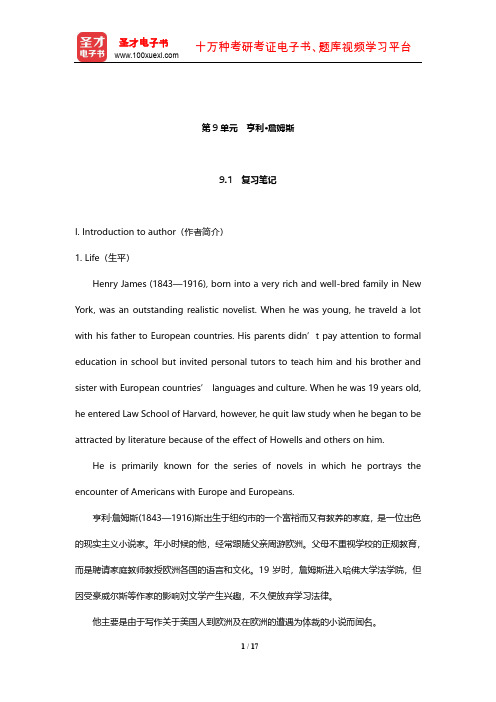
第9单元亨利•詹姆斯9.1 复习笔记I. Introduction to author(作者简介)1. Life(生平)Henry James (1843—1916), born into a very rich and well-bred family in New York, was an outstanding realistic novelist. When he was young, he traveld a lot with his father to European countries. His parents didn’t pay attention to formal education in school but invited personal tutors to teach him and his brother and sister with European countries’ languages and culture. When he was 19 years old, he entered Law School of Harvard, however, he quit law study when he began to be attracted by literature because of the effect of Howells and others on him.He is primarily known for the series of novels in which he portrays the encounter of Americans with Europe and Europeans.亨利·詹姆斯(1843—1916)斯出生于纽约市的一个富裕而又有教养的家庭,是一位出色的现实主义小说家。
年小时候的他,经常跟随父亲周游欧洲。
陶洁《美国文学选读》(第3版)章节题库-19世纪美国诗人【圣才出品】
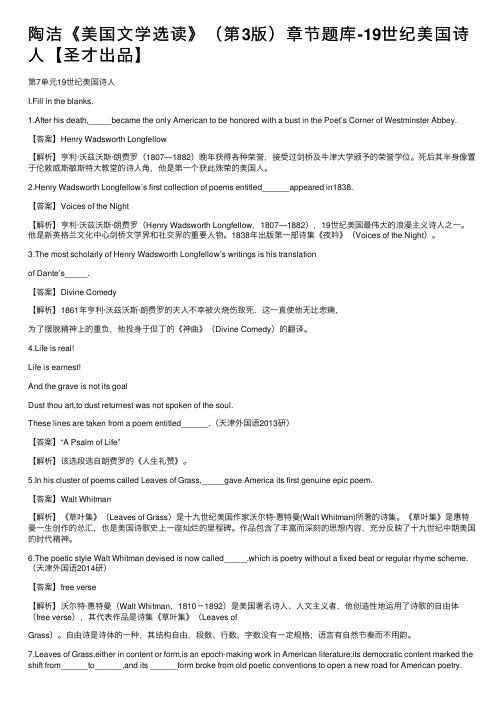
陶洁《美国⽂学选读》(第3版)章节题库-19世纪美国诗⼈【圣才出品】第7单元19世纪美国诗⼈I.Fill in the blanks.1.After his death,_____became the only American to be honored with a bust in the Poet’s Corner of Westminster Abbey.【答案】Henry Wadsworth Longfellow【解析】亨利·沃兹沃斯·朗费罗(1807—1882)晚年获得各种荣誉,接受过剑桥及⽜津⼤学颁予的荣誉学位。
死后其半⾝像置于伦敦威斯敏斯特⼤教堂的诗⼈⾓,他是第⼀个获此殊荣的美国⼈。
2.Henry Wadsworth Longfellow’s first collection of poems entitled______appeared in1838.【答案】Voices of the Night【解析】亨利·沃兹沃斯·朗费罗(Henry Wadsworth Longfellow,1807—1882),19世纪美国最伟⼤的浪漫主义诗⼈之⼀。
他是新英格兰⽂化中⼼剑桥⽂学界和社交界的重要⼈物。
1838年出版第⼀部诗集《夜吟》(Voices of the Night)。
3.The most scholarly of Henry Wadsworth Longfellow’s writings is his translationof Dante’s_____.【答案】Divine Comedy【解析】1861年亨利·沃兹沃斯·朗费罗的夫⼈不幸被⽕烧伤致死,这⼀直使他⽆⽐悲痛,为了摆脱精神上的重负,他投⾝于但丁的《神曲》(Divine Comedy)的翻译。
4.Life is real!Life is earnest!And the grave is not its goalDust thou art,to dust returnest was not spoken of the soul.These lines are taken from a poem entitled______.(天津外国语2013研)【答案】“A Psalm of Life”【解析】该选段选⾃朗费罗的《⼈⽣礼赞》。
- 1、下载文档前请自行甄别文档内容的完整性,平台不提供额外的编辑、内容补充、找答案等附加服务。
- 2、"仅部分预览"的文档,不可在线预览部分如存在完整性等问题,可反馈申请退款(可完整预览的文档不适用该条件!)。
- 3、如文档侵犯您的权益,请联系客服反馈,我们会尽快为您处理(人工客服工作时间:9:00-18:30)。
第1单元本杰明•富兰克林1.1复习笔记I.Introduction to author(作者简介)Benjamin Franklin(1706—1790)was a rare genius in human history.He became everything:a printer,postmaster,almanac maker,essayist,scientist, inventor,orator,statesman,philosopher,political economist,ambassador,—“Jack of all trades.”本杰明·富兰克林(1706—1790)是人类历史上少有的天才。
他是出版家、邮政总长、历书作者、散文家、科学家、发明家、演说家、政治家、哲学家、政治经济学家、大使等等。
1.Life(生平)He was born into a poor family.He was a voracious reader.At16he published essays under the pseudonym Silence Dogood.At17he ran away to Philadelphia to make his own fortune.He became a printer.He helped found the Pennsylvania Hospital,an academy which led to the University of Pennsylvania,and the American Philosophical Society.He was a preeminent scientist of his day.He signed the Declaration of Independence.He was one of the makers of the new nation.富兰克林出生于一个贫穷的家庭。
他非常勤奋好学。
16岁时开始以笔名“静行善”发表评论文章。
17岁时只身逃往费城谋生。
后成为出版商。
他帮助建立了宾夕法尼亚大学的前身——宾夕法尼亚医学院和北美哲学学会。
他也是当时著名的科学家。
他签署过《独立宣言》。
他是美国的缔造者之一。
2.Major works(主要作品)Poor Richard’s Almanac(1732)《穷理查历书》(或译《格言历书》)The Autobiography(1771—1790)《自传》Ⅱ.Selected works(选读作品)◆The Autobiography《自传》1.Main content(主要内容)It depicted the background of Benjamin Franklin,including his studying in his young age and his experiences of work.And his achievement in politics,science and economy were also mentioned in this book.There are four parts in this book.The first part is the experiences of his first25 years of his life.The second part,written in Paris,is the accomplishments on science and the cause of public affairs.The third and fourth part,written in Philadelphia,is the record of his life from25to51-year-old.这本书主要记叙了本杰明的成长经历,包括年少时的读书及工作经历。
书中也讲述了他在政治、科学及经济领域取得的成就。
本书共有四部分。
第一部分讲述了他一生前25年的经历。
第二部分写于巴黎,侧重描写在科学上的成就及他所从事的公共事业。
第三、四两部分写于费城,先后记叙了他从25岁至51岁的生活。
ments(赏析)(1)The Autobiography was probably the first of its kind in literature.It is the simple yet immensely fascinating record of a man rising to wealth and fame from a state of poverty and obscurity into which he was born,the faithful account of the colorful career of America’s first self-made man.He represented in America all its ideas,that man is basically good and free by nature,endowed by God with certain inalienable rights of liberty and the pursuit of happiness.Through telling a success story of self-reliance,the book celebrates the fulfillment of the American dream.(2)The Autobiography is also an eloquent elucidation of the fact that Franklin was spokesman for the new order of eighteenth-century enlightenment.It is also a Puritan document.It is a record of self-examination and self-improvement.The book is also a convincing illustration of the Puritan ethic that,in order to get on in the world,one has to be industrial,frugal and prudent.(3)The style of The Autobiography reveals that it is the pattern of Puritan simplicity,directness and concision.(1)《自传》是自传体文学中的上乘佳作。
它简明而极其引人入胜地叙述了富兰克林由穷苦卑微而跃至富有、闻名的故事。
它忠实地记录了美国第一位自力更生者光辉灿烂的职业生涯。
他代表着在美国,人的本质是善良自由的,拥有上帝赋予的不可剥夺的自由及追求幸福的权利。
该书通过讲述自力更生而获取成功的故事,歌颂了美国梦的实现。
(2)《自传》充分说明了富兰克林是18世纪美国启蒙运动的代言人。
这也是一本清教文献。
它记录了清教徒的自我反省和自我完善。
它也是清教道德原则的最好说明,为了取得成功,人必须勤劳、简朴、谨慎。
(3)《自传》的文体体现出清教徒朴素、直爽、简洁的风格。
1.2课后习题详解1.Why did Franklin write his Autobiography?Key:Because when he was young,he has“never had a pleasure in obtaining any anecdotes”of his ancestors,and he held that it was a great pity because he was curious about them.So,he thought that his son would also want to know the story of him and he himself also had responsibility to share it with his son.In addition,he thought that his experiences and success would give some useful advice to his son.With such consideration in mind,Franklin wrote his autobiography.2.What made Franklin decide to leave the brother to whom he had been apprenticed?Key:The altercation between Franklin and his brother made him decide to leave. His brother considered himself as Franklin’s master and treated him harshly and tyrannically.This kind of treatment annoyed Franklin,so he decided to leave.3.How did he arrive in Philadelphia?Key:He arrived in Philadelphia with great difficulties.At the very start,he set out in a boat for Amboy,and in crossing the bay he,along with his companions,metwith a squall that tore the rotten sails to pieces and drove him upon Long Island. On approaching the island,they had to drop anchor and swim out their cable towards the shore,etc.In a word,he went through many hardships on the way to Philadelphia.4.What features do you find in the style of the above selection?Key:This selection is written in the form of letters to his son.By this way,it can show the author’s honesty and frankness,which will make the reader stand close to him and actually feel and understand his emotions and experiences.Another feature is that this biography has a good narrative and reads like a story,which can arouse the readers’reading interest and curiosity.1.3考研真题与典型题详解I.Fill in the blanks.1.If we say Jonathan Edwards represents the upper levels of the American mind, _____represents the lower levels.【答案】Benjamin Franklin【解析】美国文学评论家范·威克·布鲁克斯(Van Wyck Brooks)在《美国的成年》(America’s Coming Age)中指出乔纳森·爱德华兹和本杰明·富兰克林是美国18世纪的两位重要的哲学家,他们是不同阶层思想的代表。
